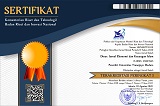The halal fashion trends for hijabi community: Ideology and consumption
Abstract
The research is based on a large enough market potential for the development of the halal fashion industry in Indonesia. The hijab fashion trend is a production target that continues to develop with various technologies and innovations, which encourage the consumption of community groups to use hijab fashion to continue to increase. The study was conducted to determine the purpose of the hijab community in using halal hijab fashion as part of their identity in demonstrating the existence of the hijab group through the ideological and consumption approaches. Qualitative analysis is carried out to determine the ideological emphasis and consumption of the hijab community through open interviews to obtain a clear picture of the social situation. The results show that religious beliefs are the main basis in encouraging the use of hijab and necessity factors.
Keywords
Full Text:
PDFReferences
Adinugraha, H. H. and Sartika, M. (2019) ‘Halal Lifestyle Di Indonesia’, An-Nisbah: Jurnal Ekonomi Syariah, 5(2), pp. 57–81. doi: 10.21274/an.2019.5.2.layout.
Ancok, D. dan Suroso, F. N. (2011) Psikologi Islam: Solusi Islam dalam Problem-problem Psikologi. Yogyakarta: Pustaka Pelajar.
Anggia, F. (2020) ‘Representasi Media Sosial atas Hijabista : Pembentukan Citra Perempuan Muslim dari Perspektif Konsumsi Info Artikel Keyword Kata Kunci Abstrak’, Jurnal Hawa, 2(1), pp. 64–74.
Aprillia, R. (no date) ‘Konsumsi dalam pandangan jean baudrillard dan al-ghazali’, Ekonomi Dan Keuangan Syariah.
Baudrillard, J. (1998) The Consumer Society, Myths and Structures. London: SAGE Publications, Ltd.
Devi, A. and Nawawi, K. M. (2018) ‘Halal Certification Implementation Strategies for Fashion Product’, in. SCITEPRESS, pp. 645–649. doi: 10.5220/0007087306450649.
Dubé, F. N., HaiJuan, Y. and Lijun, H. (2016) ‘Halal certification system as a key determinant of firm internationalisation in the Philippines and Malaysia’, Asian Academy of Management Journal, 21(1), pp. 73–88.
Faried, A. I. (2019) ‘Implementasi Model Pengembangan Industri Halal Fashion Di Indonesia’, Jurnal kajian Ekonomi dan Kebijakan Publik, 4(2), pp. 9–19.
Fithriana, A. and Nopitasari, W. (2018) ‘Modest Fashion: Diplomatic Creativity in Supporting Halal Tourism’, IJECA (International Journal of Education and Curriculum Application), p. 28. doi: 10.31764/ijeca.v0i0.1974.
Hanzaee, K. H. and Chitsaz, S. (2011) ‘A review of influencing factors and constructs on the Iranian women ’ s Islamic fashion market’, Interdisciplinary Journal of Research in Business, 1(April), pp. 94–100.
Haro, A. (2020) ‘Are Zoya Muslim Fashion Products as Halal Lifestyle in Consumer Purchase Decision?’, Advances in Economics, Business and Management Research, volume 144 23rd Asian Forum of Business Education(AFBE 2019), (June). doi: 10.2991/aebmr.k.200606.033.
Hassan, S. H. and Harun, H. (2016) ‘Factors influencing fashion consciousness in hijab fashion consumption among hijabistas’, Journal of Islamic Marketing, 7(4), pp. 476–494. doi: 10.1108/JIMA-10-2014-0064.
Huda, N., Hulmansyah, H. and Rini, N. (2018) ‘Faktor Yang Mempengaruhi Perilaku Konsumsi Produk Halal Pada Kalangan Mahasiswa Muslim’, EKUITAS (Jurnal Ekonomi dan Keuangan), 2(2), pp. 247–270. doi: 10.24034/j25485024.y2018.v2.i2.3944.
Kavakci, E. and Kraeplin, C. R. (2017) ‘Religious beings in fashionable bodies: the online identity construction of hijabi social media personalities’, Media, Culture and Society, 39(6), pp. 850–868. doi: 10.1177/0163443716679031.
Mahanani, P. A. R. (2017) ‘Perempuan Salafi Memaknai Jilbab: Antara Alternatif dan Oposisional’, Jurnal Sosial Politik, 2(1), p. 123. doi: 10.22219/sospol.v2i1.4760.
Martiana, A., Maesyaroh and Sobar (2018) ‘Motivation and obstacles faced by women halal fashion entrepreneurs and role of the business on women’s economic empowermentin Yogyakarta Indonesia’, Humanities and Social Sciences Reviews, 6(2), pp. 106–110. doi: 10.18510/hssr.2018.6213.
Muflihin, M. D. (2019) ‘Indikator Halal dalam Industri Halal Fashion’, Jurnal Saujana, 01, pp. 53–69. Available at: http://ejournal.steikassi.ac.id/index.php/111/article/view/24.
Rohman, A. (2016) ‘Budaya Konsumerisme dan Teori Kebocoran di Kalangan Mahasiswa’, KARSA: Jurnal Sosial dan Budaya Keislaman, 24(2), p. 237. doi: 10.19105/karsa.v24i2.894.
Rubawati, E. et al. (2018) ‘Halal Women Fashion: Beauty Reflect Blessing’, IOP Conference Series: Earth and Environmental Science, 175(1). doi: 10.1088/1755-1315/175/1/012197.
Rusydiana, A. S. and L. M. (2020) ‘Analisis Sentimen terkait Sertifikasi Halal’, Journal of Economics and Business Aseanomics, 5(110), pp. 69–85.
Sardiana, A. (2020) ‘Halal Literacy and Halal Product Purchase Dimension: A Preliminary Study’, Insight Journal, (March). doi: 10.13140/RG.2.2.31540.81284.
Septiana, A. (2015) ‘Analisis Perilaku Konsumsi Dalam Islam’, Dinar, 1(1), pp. 1–17. Available at: https://journal.trunojoyo.ac.id/dinar/article/download/2688/2162.
Septiani, D. and Ridlwan, A. A. (2020) ‘The Effects of Halal Certification and Halal Awareness on Purchase Intention of Halal Food Products in Indonesia’, Indonesian Journal of Halal Research, 2(2), pp. 55–60. doi: 10.15575/ijhar.v2i2.6657.
Slamet, S. (2006) Filsafat dan Idiologi Pancasila. Yogyakarta: CV. Andi Offset.
Soeharto (2009) Teori Ekonomi Mikro, Beaya Produksi. Yogyakarta: Andi.
Suprapti, N. W. . (2010) Perilaku Konsumen: Pemahaman Dasar dan Aplikasinya dalam Strategi Pemasaran. Denpasar-Bali: Udayana Universiti Press.
Syamsuddin, dkk (2009) Pendidikan Pancasila. Yogyakarta: Total Media.
Syaputra, E. (2017) ‘Perilaku Konsumsi Masyarakat Modern Perspektif Islam: Telaah Pemikiran Imam Al-Ghazali dalam Ihya’ Ulumuddin’, FALAH: Jurnal Ekonomi Syariah, 2(2), p. 144. doi: 10.22219/jes.v2i2.5102.
Teo, B. C. C., Nik, N. S. and Azman, N. F. (2017) ‘Making sense of fashion involvement among Malaysian Gen Y and its implications’, Journal of Emerging Economies and Islamic Research, 5(4), p. 10. doi: 10.24191/jeeir.v5i4.6236.
Warto, W. and Samsuri, S. (2020) ‘Sertifikasi Halal dan Implikasinya Bagi Bisnis Produk Halal di Indonesia’, Al Maal: Journal of Islamic Economics and Banking, 2(1), p. 98. doi: 10.31000/almaal.v2i1.2803.
Zainudin, M. I., Haji Hasan, F. and Othman, A. K. (2019a) ‘Halal brand personality and brand loyalty among millennial modest fashion consumers in Malaysia’, Journal of Islamic Marketing. doi: 10.1108/JIMA-10-2018-0187.
Zainudin, M. I., Haji Hasan, F. and Othman, A. K. (2019b) ‘Halal brand personality and brand loyalty among millennial modest fashion consumers in Malaysia’, Journal of Islamic Marketing, (August). doi: 10.1108/JIMA-10-2018-0187.
DOI: https://doi.org/10.21107/dinar.v8i2.9683
Refbacks
- There are currently no refbacks.
Copyright (c) 2021 Nilda Susilawati, Miti Yarmunida, Khairiah Elwardah

This work is licensed under a Creative Commons Attribution-ShareAlike 4.0 International License.
Journal Dinar Indexed by:
Dinar: Jurnal Ekonomi dan Keuangan Islam by Universitas Trunojoyo Madura is licensed under a Creative Commons Attribution-ShareAlike 4.0 International License.






.png)










